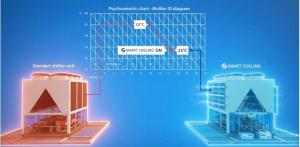Smart Cooling Systems Market Size, Share & Trends, 2030
global Smart Cooling Systems market was valued at US$ 26630 million in 2022 and is anticipated to reach US$ 166390 million by 2030
PORTLAND, UNITED STATES, UNITED STATES, June 8, 2023/EINPresswire.com/ -- The demand for efficient and sustainable cooling solutions is rapidly increasing as industries and individuals seek to reduce energy consumption and minimize environmental impact. Smart cooling systems, equipped with advanced technologies and intelligent features, are revolutionizing the way we cool our spaces. This blog explores the smart cooling systems market, highlighting its significance, key features, applications, and the factors driving its exponential growth.
Download Free Sample Report (254 Pages PDF with Insights, Charts, Tables, and Figures): https://www.alliedmarketresearch.com/request-sample/1825
The Significance of Smart Cooling Systems:
Smart cooling systems leverage innovative technologies, including Internet of Things (IoT) connectivity, data analytics, and automation, to optimize cooling processes, reduce energy consumption, and enhance user comfort. These systems go beyond traditional cooling methods, offering real-time monitoring, intelligent controls, and personalized experiences for a range of applications.
Key Features and Advantages:
Energy Efficiency: Smart cooling systems prioritize energy efficiency by intelligently adjusting cooling settings based on real-time data. They utilize advanced algorithms and predictive analytics to optimize cooling operations, resulting in reduced energy consumption and lower utility costs.
Remote Monitoring and Control: With IoT connectivity, smart cooling systems enable remote monitoring and control capabilities. Users can access and manage their cooling systems through mobile apps or web interfaces, allowing them to adjust settings, monitor energy usage, and receive alerts or notifications from anywhere at any time.
Data Analytics and Insights: Smart cooling systems collect and analyze data related to cooling patterns, energy consumption, and environmental conditions. These insights provide valuable information for optimizing cooling strategies, identifying potential issues, and making data-driven decisions to improve overall efficiency.
Adaptive and Personalized Cooling: Smart cooling systems can adapt to user preferences and environmental conditions, delivering personalized cooling experiences. They can adjust temperature, airflow, and cooling schedules based on individual requirements, maximizing comfort while minimizing energy waste.
Integration with Smart Home Technologies: Smart cooling systems can seamlessly integrate with other smart home technologies, creating a connected ecosystem. Integration with voice assistants, smart thermostats, and energy management systems enhances overall control and automation capabilities, allowing for a more synchronized and efficient home environment.
Purchase Inquiry: https://www.alliedmarketresearch.com/purchase-enquiry/1825
Applications of Smart Cooling Systems:
Smart cooling systems find applications across various sectors, including:
Residential Buildings: Smart cooling systems provide personalized cooling experiences in residential properties. Homeowners can optimize energy usage, schedule cooling based on occupancy, and remotely control cooling settings, ensuring comfort and cost savings.
Commercial Buildings: From offices and retail spaces to hotels and healthcare facilities, smart cooling systems enhance energy efficiency and occupant comfort in commercial buildings. They offer intelligent zoning, occupancy sensing, and remote management, enabling precise control over cooling operations.
Data Centers: Data centers require efficient cooling to maintain optimum temperatures for IT equipment. Smart cooling systems in data centers optimize cooling infrastructure, monitor airflow, and adjust cooling capacity based on server load, ensuring optimal performance and energy efficiency.
Industrial Facilities: Industries such as manufacturing, logistics, and warehousing rely on effective cooling systems to maintain product quality, equipment efficiency, and employee comfort. Smart cooling systems enable real-time monitoring, automated controls, and energy optimization in industrial environments.
Market Growth and Future Prospects:
The smart cooling systems market is witnessing rapid growth and is poised for further expansion. Several factors contribute to this growth:
Increasing Focus on Sustainability: With the rising awareness of environmental concerns, there is a growing demand for energy-efficient and eco-friendly cooling solutions. Smart cooling systems align with sustainability goals by optimizing energy consumption and reducing greenhouse gas emissions.
Buy Now - https://www.alliedmarketresearch.com/checkout-final/5440ce40eb5c0a4881889939620250ce
Government Regulations and Incentives: Governments worldwide are implementing regulations and providing incentives to promote energy efficiency and smart technologies. These initiatives encourage the adoption of smart cooling systems and drive market growth.
David Correa
Allied Analytics LLP
+ + 1-800-792-5285
email us here
Legal Disclaimer:
EIN Presswire provides this news content "as is" without warranty of any kind. We do not accept any responsibility or liability for the accuracy, content, images, videos, licenses, completeness, legality, or reliability of the information contained in this article. If you have any complaints or copyright issues related to this article, kindly contact the author above.

